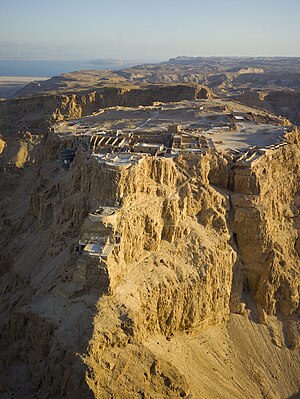Siege of Masada
| Siege of Masada | |||||||
|---|---|---|---|---|---|---|---|
| Part of the First Jewish–Roman War | |||||||
 Masada National Park |
|||||||
|
|||||||
| Belligerents | |||||||
| Jewish Sicarii | Roman Empire | ||||||
| Commanders and leaders | |||||||
| Eleazar ben Ya'ir | Lucius Flavius Silva | ||||||
| Strength | |||||||
| 967, including non-combatants |
Legio X Fretensis 4,800 Auxiliaries and slaves 4,000–10,000 |
||||||
| Casualties and losses | |||||||
| 960 dead, 7 captured (2 women, 5 children) | Unknown | ||||||
The siege of Masada was one of the final events in the First Jewish–Roman War, occurring from 73 to 74 CE on a large hilltop in current-day Israel. The siege was chronicled by Flavius Josephus, a Jewish rebel leader captured by the Romans, in whose service he became a historian. According to Josephus the long siege by the troops of the Roman Empire led to the mass suicide of the Sicarii rebels and resident Jewish families of the Masada fortress. Masada has become a controversial event in Jewish history, with some regarding it as a place of reverence, commemorating fallen ancestors and their heroic struggle against oppression, and others regarding it as a warning against extremism and the refusal to compromise.
Masada is "a lozenge-shaped table-mountain" that is "lofty, isolated, and to all appearance impregnable". The terrain made it difficult to reach the top of the mountain because there was only one narrow pathway, not even wide enough for two people to climb together. This pathway is known as "the Snake" because it "worms its way to the summit with many ingenious zig-zags". The fortress of Masada has been referred to as the place where David rested, after he "fled from his father-in-law, King Saul".
Flavius Josephus, a Jew born and raised in Jerusalem, is the only historian to provide a detailed account of the Great Jewish Revolt and the only person who recorded what happened on Masada. After being captured during the Siege of Yodfat and then freed by Vespasian, Josephus chronicled the Roman campaign. Josephus presumably based his narration on the field commentaries of the Roman commanders. According to Josephus, Masada was first constructed by the Hasmoneans. Between 37 and 31 BCE Herod the Great fortified it as a refuge for himself in the event of a revolt.
...
Wikipedia
